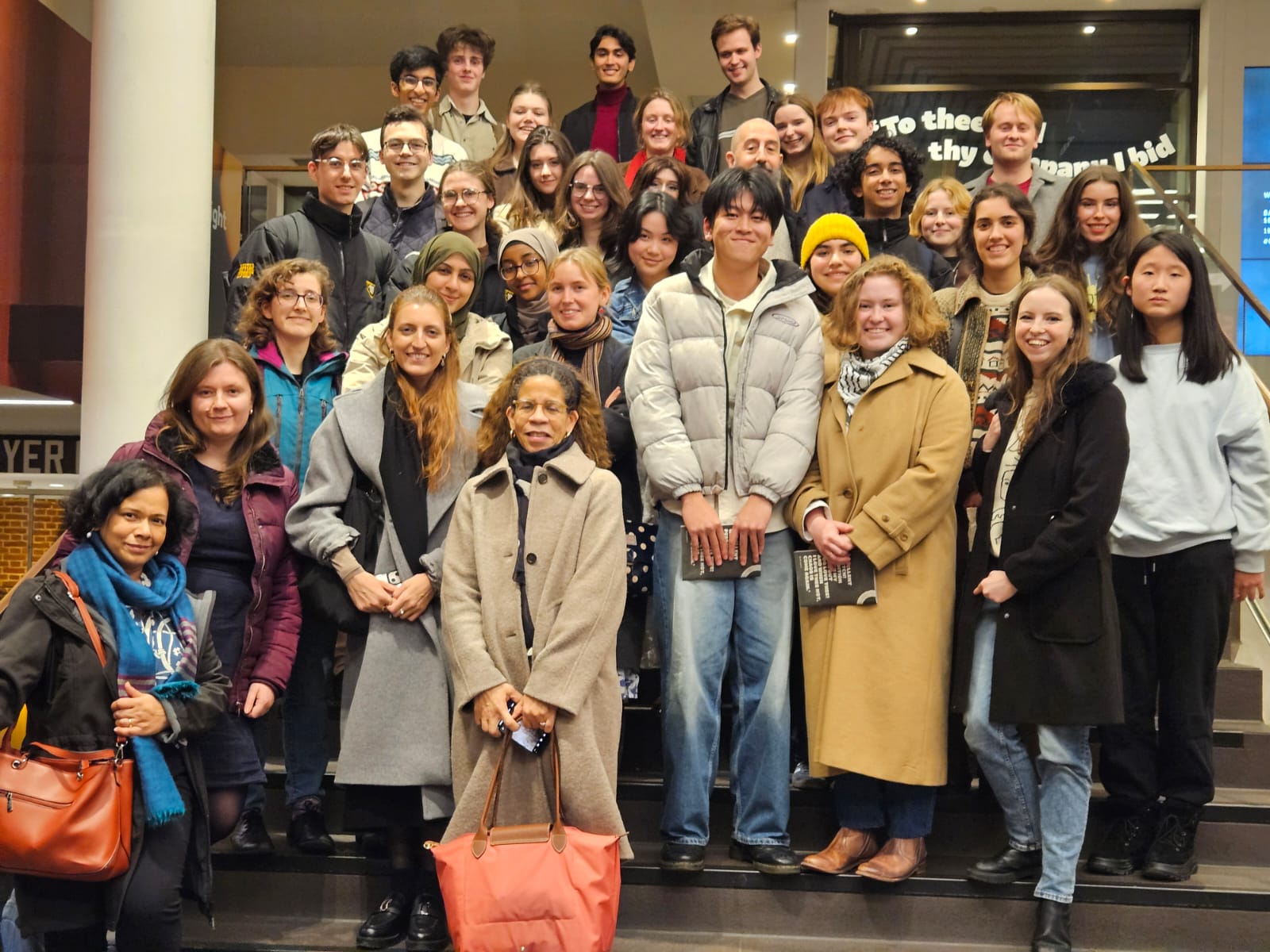Student voices: Ana Bradley (2023, English) on a field trip to see Shakespeare’s Othello
On the 7 February, Exeter College’s Fellows in English took students on a free trip to London to see Shakespeare’s Othello. Directed by Ola Ince and staged in the Sam Wanamaker Playhouse, adjoining the Globe, the candle-lit production intertwined new and old in a deeply relevant and enjoyable adaption. The play gave us the opportunity to engage with Othello’s enduring examination of race, but also, in its moments of light-heartedness, to enjoy an evening getting to know students and tutors from across the College.
Whilst the play was staged in Shakespearian language, Ince’s adaption transplants it into a modern context, creating a palimpsest of old and new. The grand streets of Venice and the island setting of Cyprus are replaced with New Scotland Yard, the military personnel with a hostile police force. This layering is even reflected in the theatre itself, which is a modern build designed to emulate the indoor theatres of Jacobean London. The old and new are brought into jarring conversation with one another, breaking down the boundaries of what we think we know about Othello, and of our contemporary political climate.
These juxtapositions are thought-provoking, but are also comedically jarring in their effect. Roderigo (Sam Swann), for example, at several points dons the costume of a Deliveroo driver, lightening the heavy themes of the play. The near-miss when his luminous green backpack almost caught fire on the candlelit chandeliers only added to the character’s comedic value, and became the butt of much laughter on the way home. But beneath the comedic surface, Ince confronts us with the sobering question of what the historicism of Shakespeare could actually tell us about the modern world. The juxtaposition of old and new forces old concepts into new light: have we really left the Machiavellian violence of characters like Iago (Ralph Davis) in the past, or do they still pervade the police force today?
Every new production of a play is a fresh critical interpretation of the original text. Just as the juxtaposition of old and new contains an inherent doubleness, Ince uses techniques of mirroring and shadowing to highlight the double nature of Othello (Ken Nwosu). In the original text, Shakespeare forces the reader to flip between two different versions of Othello—the accomplished military commander driven mad by his Machiavellian ensign, and the black man whose savage and animalistic subconscious eventually gets the better of him. One reading is a pertinent comment on how we treat black people in both Shakespearean and modern society, and the other is a deeply racist assumption of black primitivism. This doubleness is highlighted in a small way through the play’s lighting. Candles cast the players into shadow, giving each character a dark visual double. However, the most striking of Ince’s innovations is that of the addition of a second actor—Ira Mandela Siobhan—as Othello’s unconscious. Ince takes doubling from amongst Shakespeare’s many thematic choices and foregrounds it, prompting students to consider reading Othello from the perspective of its double-nature. Is the play racist or anti-racist? Is Othello hero or victim? Good or evil?
Siobhan’s performance was the most discussed as we left the theatre—the actor’s mastery over his character was awe-inspiring to watch. Othello’s double moved with the grace of a cat, silent and not-quite-human. Invisible to the other characters, but intimately known by Othello himself, the unconscious on some levels seems to portray Othello’s innate animalism. His presence makes the viewer distinctly uncomfortable, both through the uncanniness of his movements and the quiet implications of Othello’s primitivism. However, combined with other techniques that make clear Ince’s commentary on the modern police force, the overwhelming takeaway of the play is one of sympathy for Othello. Throughout, the racist epithets used by Shakespeare’s characters to repeatedly demean Othello are played over walkie-talkie. Iago’s scheming is terrifyingly calculated, and Othello’s initial appearance on stage—in handcuffs—sets the tone for a man who has been fated from the start. The ending of the play is even more prescribed. Whilst most students felt it was too on-the-nose, Iago and Othello are arrested and have their mugshots taken while headlines detailing their crimes are read aloud. The headlines hold up a mirror to our modern treatment of racialised police violence, and find this treatment lacking.
In interview, Ince says that she is thinking about ‘the many faces of Othello’, and it shows. The play’s many-faces bring together old and new, racism and anti-racism, and conscious and subconscious. For Exeter students, the adaption opened up new ways of discussing Othello and, as we drove across Blackfriar’s Bridge on our way back from the show and observed the London skyline—a palimpsest combining the apparent antiquity of St Paul’s with the modern sky-scrapers—we were struck by the multiplicity not only of Shakespeare’s Othello, but the political world that we inhabit.

Exonians visit the Sam Wanamaker Playhouse
